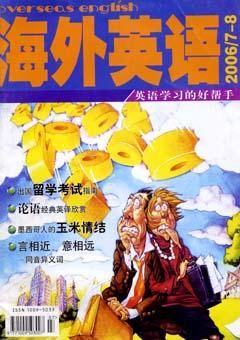謝謝
Many years ago,when I was fresh out of school and working in Denver,I was driving to my parents home in Missouri for Christmas.I stopped at a gas station about 50 miles from Oklahoma City,where I was planning to stop and visit a friend.I pumped the tank full,stood in line at the cash register,and said hello to an older couple who were also paying for gas.
I took off,but had gone only a few miles when black smoke poured from my exhaust pipe.I pulled over and wondered what I should do.
A car pulled up behind me.It was the couple I had spoken to at the gas station.They said they would take me to my friends. We chatted on the way into the city, and when I got out of the car, the husband gave me his business card.
I wrote him and his wife a thank-you note for rescuing me.Soon afterward,I received a Christmas package from them.Their note that came with it said that helping me had made their holidays meaningful.
Years later,I drove through a foggy morning to a conference in a nearby town.In late afternoon I returned to my car and found that Id left the lights on all day,and the battery was dead.Then I noticed that the Friendly Ford dealership was right next door.I walked over and found two salesmen relaxing in a showroom devoid of customers.
“Just how friendly is Friendly Ford?”I asked and explained my trouble.
They quickly drove a pickup truck to my car,attached jumper cables,and started my car.They would accept no payment,so when I got home,I wrote them a note to say thanks.
I received a letter back from one of the salesmen.No one had ever taken the time to write him and say thank you,and it meant a lot,he said.
Another few years had passed when a friends husband died. Pat had been a well-respected doctor at a big hospital, and hundreds of cards were sent to the family.Among them was a sympathy card from a plumber who had once worked at their house.He wrote that when Pat had paid the bill,he wrote on the invoice, “Thank you for a good job.”
Thank you—two powerful words.Theyre easy to say and mean so much.
多年前,當我剛走出校門并在丹佛工作的時候,我驅車去父母在密蘇里州的家過圣誕節。在距離俄克拉荷馬州加油站50英里的地方我停下來,我計劃去拜訪一位朋友。我將油箱加滿,排隊站在收銀機前,主動向一對也在付油款的老年夫婦問好。
我發動汽車離去,但沒走幾英里遠,濃煙從我汽車的排氣管中冒出來。我把車開到路邊,開始考慮下一步該怎么辦。
一輛車緊接著我的車停下來。是那一對我在加油站里打過招呼的老年夫婦。他們說他們會把我送到朋友的家中。在去城里的路上我們交談著,當我走下車時,那位老年男士遞給我一張他的商業名片。
我寫了一封信來對他們給予我的援助表示了感謝。不久我收到他們寄來的圣誕包裹。包裹中有張便條上寫著,幫助我使他們的假日生活變得更有意義。
數年后,在一個霧氣朦朧的早上,我開車去附近一個城鎮開會。傍晚的時候我回到我的車的旁邊,發現我車上的燈亮了一天,蓄電池已經沒電了。過了一會兒我發現福特經銷商就在隔壁。我走過去發現店里沒有顧客,只有兩個銷售人員在展示廳里消遣。
“不知你們福特公司能否幫我一下?”我邊問邊解釋了我的困境。
他們很快開著一個輕便小貨車來到我的汽車旁,接上跳線電纜,然后發動我的汽車。他們沒有收取任何報酬,當我回到家后,我寫信向他們表示感謝。
我收到了一位銷售人員的回信。沒有人曾經花費時間給他寫信向他表示感謝,而我的感謝信對他來說意味深長,他說。
幾年后,一個朋友的丈夫去世。帕特曾經是一家大醫院中一位德高望重的醫生,此時家里收到數百張卡片。卡片中有一張上面充滿同情的話語,是曾經在他們房中干過活的一位水管工寄來的。當帕特支付賬單時他在一張發票上寫道,“謝謝你完美的工作。”
謝謝——這是兩個威力無比的單詞。它們很容易說出口并且意味深長。

